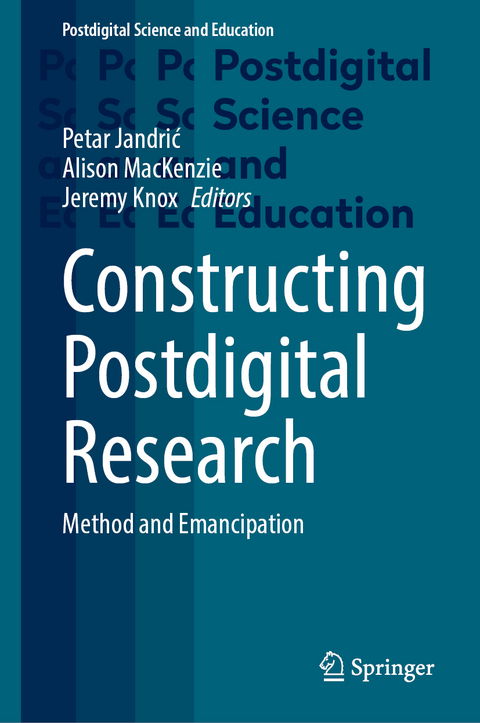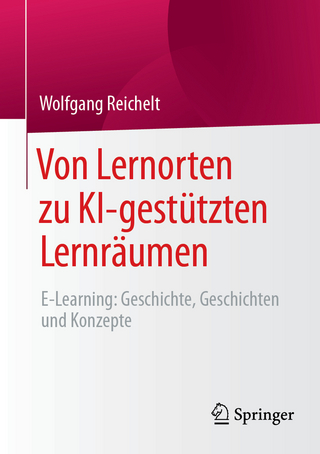
Constructing Postdigital Research
Springer International Publishing (Verlag)
978-3-031-35410-6 (ISBN)
This book delves into the various methods of constructing postdigital research, with a particular focus on the postdigital dynamic of inclusion and exclusion, as well as the interplay between method and emancipation. By answering three fundamental questions - the relationship between postdigital theory and research practice, the relationship between method and emancipation, and how to construct emancipatory postdigital research - the book serves as a comprehensive resource for those interested in conducting postdigital research.
Constructing Postdigital Research: Method and Emancipation is complemented by Postdigital Research: Genealogies, Challenges, and Future Perspectives, also edited by Petar Jandric, Alison MacKenzie, and Jeremy Knox, which explores these questions in theory.
lt;p>Petar Jandric (PhD) is a Professor at the University of Applied Sciences in Zagreb (Croatia), Visiting Professor at the University of Wolverhampton (UK), and Visiting Associate Professor at the University of Zagreb (Croatia). His research interests are focused to the intersections between critical pedagogy and information and communication technologies. Research methodologies of his choice are inter-, trans- and anti-disciplinarity. Petar's previous academic affiliations include Croatian Academic and Research Network, National e-Science Centre at the University of Edinburgh, Glasgow School of Art and Cass School of Education at the University of East London. He writes, edits and reviews books, articles, course modules and study guides, serves in editorial boards of scholarly journals and conferences, participates in diverse projects in Croatia and in the United Kingdom, regularly publishes popular science and talks in front of diverse audiences. His major current projects are focused to collaborative research and editing.
Alison MacKenzie is a Senior Lecturer at Queen's University Belfast (and former secondary school teacher in Scotland). She is the Programme Director for the master's programme in Special Educational Needs and Inclusion, and former Director of the Postgraduate Certificate in Teacher Education at Queen's University. Her research interest and publications are primarily concerned with social injustice, which she examines through epistemic injustice, epistemology of deceit and ignorance, feminism, and the Capabilities Approach; she also has a keen interest in Bourdieu's sociological analysis of inequality. Alison has been nominated, short-listed for, and won numerous awards related to her teaching and supervision.
Jeremy Knox is co-director of the Centre for Research in Digital Education at the University of Edinburgh (Scotland). His research interests include the relationships between education, data driven technologies such as artificial intelligence (AI), and wider society, and he has led projects funded by the ESRC and the British Council. Jeremy's published work includes critical perspectives on artificial intelligence, learning analytics, data and algorithms, as well as Open Educational Resources (OER) and Massive Open Online Courses (MOOCs). This includes the monograph Posthumanism and the MOOC: contaminating the subject of global education, and the edited volume Artificial Intelligence and Inclusive Education: Speculative Futures and Emerging Practices. He is Associate editor of the journal Postdigital Science and Education, and also co-convenes the Society for Research in Higher Education (SRHE) Digital University network.
Part 1: Constructing Postdigital Research.- 1.Artificial intelligence in education research: a critical analysis and case study.- 2.Algorithmic systems claim education - and (re)production of societies.- 3.Constructing design knowledge for postdigital science and education.- 4.Collaborative Immersive Qualitative Analysis - A scenographic turn in postdigital research.- 5.Post-qualitative approaches in and for the postdigital age: towards speculative empirical methodologies.- 6.Discovering postdigital contexts using Actor Network Theory. A methodological toolkit and guide.- Part 2: Exclusions and Inclusions.- 7.International Human Rights in The Posthuman Era.- 8.Understanding children's civil, political and social rights through a postdigital epistemology of silence.- 9.Digital Online Code of Practice and Human Rights Conventions to Protect Women Against Violence: Feminist Philosophy as Postdigital Method.- 10.Caring cuts into the postdigital - exploring postdigital methodologies withfeminist STS approaches.- 11.Va and post-simultaneities: indigenising posthumanism and the postdigital research relatings.- Part 3: Method and Emancipation.- 12.What's not to learn? A critical evaluation of the potential impact of Postdigital arts-based research as Resistance.- 13.Postdigital soundscape research.- 14.Maps as method in critical applied linguistics.- 15.Epistemological implications of digital messaging platforms: a case study in Lebanon.- 16.Vestigial Research for Postdigital Pataphysics.
"This book helped me to grasp the multifaceted and boundary blurring nature of postdigital research and perceive the ambiguity and fluidity inherent in postdigital practices. While these issues are especially relevant for emerging researchers and those new to the postdigital perspective, I imagine that the book will also be useful for advanced scholars seeking to improve and critically reflect on their research practice." (Katharina Poltze, Postdigital Science and Education, Vol. 6 (2), 2024)
| Erscheinungsdatum | 03.08.2023 |
|---|---|
| Reihe/Serie | Postdigital Science and Education |
| Zusatzinfo | XXXVI, 387 p. 1 illus. |
| Verlagsort | Cham |
| Sprache | englisch |
| Maße | 155 x 235 mm |
| Gewicht | 793 g |
| Themenwelt | Schulbuch / Wörterbuch ► Unterrichtsvorbereitung ► Unterrichts-Handreichungen |
| Sozialwissenschaften ► Pädagogik ► Schulpädagogik / Grundschule | |
| Schlagworte | Constructing Postdigital Research • Emancipatory postdigital research • Postdigital dynamic of inclusion and exclusion • Postdigital research and education • Postdigital research practice |
| ISBN-10 | 3-031-35410-9 / 3031354109 |
| ISBN-13 | 978-3-031-35410-6 / 9783031354106 |
| Zustand | Neuware |
| Haben Sie eine Frage zum Produkt? |
aus dem Bereich


